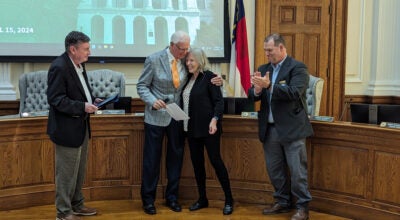More and more people trading landlines for cellphones
Published 12:00 am Sunday, January 8, 2012
By Karissa Minn
kminn@salisburypost.com
SALISBURY — Granite Quarry resident David Pruett hasn’t had a landline telephone in about three years, and he doesn’t miss it.
“I like not having a home phone,” he said. “It’s cheaper… and if I move, it makes things a lot easier. I just pick up the phone, pick up the charger and go.”
Pruett isn’t the only one cutting the cord for more money and convenience.
According to an annual national health survey by the Centers for Disease Control and Prevention (CDC), a quarter of North Carolina adults lived in cellphone-only households as of June 2010.
In the CDC’s modeled estimates, that number (25.2 percent) has risen steadily from 17.5 percent in June 2008 and 21.8 percent in June 2009.
Pruett used to have a conventional landline and later tried a Voice over IP (VoIP) service, which lets customers make calls over an Internet connection.
After he was laid off by Freightliner in 2008, Pruett moved from Cleveland to Granite Quarry and cut his expenses.
“I went without a phone for a while, and I kind of enjoyed that,” Pruett said. “When I looked at my parents’ bills — and other people’s — I was seeing (them pay) $70 for the same thing I could get with a cellphone.”
About two years ago, Pruett began using a prepaid mobile phone. Now, for the cost of $50 a month to Boost Mobile, his new smartphone replaces not only his landline but also his Internet connection.
He and his wife rely on their cellphones for both services.
“I like it; I’m not holding a phone in one hand and a computer at the other,” Pruett said. “We don’t even need a computer. We have a laptop we use for media storage and that’s about it.”
Rob Altemare, a Salisbury resident, cuts costs by using a Sprint cellphone and a VoIP service called magicJack.
“I’m pretty happy with that,” he said. “For magicJack, it’s $20 a year — unbelieveable.”
Altemare said he uses the VoIP service for long conversations because it saves minutes and has clearer call quality. Instead of connecting directly to a router or modem to make Internet calls, the device plugs into a computer. While using that line, he can talk through a normal telephone headset.
“If my computer’s not working, I can’t use it,” Altemare said. “If there’s a blackout, I have no phone. So it’s not carefree, but it’s better than paying $60 to $80 a month.”
• • •
According to the CDC study, 12.4 percent of North Carolina adults lived in landline-only households as of June 2010, meaning cellphone-only households have become more common than those with just a landline.
“There has been a decline in the number of homes with phone access lines for some time now, as wireless usage has increased,” AT&T representative Josh Gelinas wrote in an email to the Post.
But people don’t have to choose between them, Gelinas said, because the company now offers both conventional landline and wireless service to its customers.
“Basic home phone service is inexpensive, and something families can’t afford to be without,” he wrote. “Wireline and wireless communications technologies will continue to coexist. They complement each other.”
Verizon also offers both wireless service and VoIP in many areas, and Time Warner Cable includes “digital voice” in its service packages. These companies offer discounted “bundles” that give customers an incentive to buy more than one service.
Over the past few years, other companies have started specializing in low-cost VoIP. Altemare said he used Vonage for a few years while living in Spencer, because his security system required a home phone.
But even as these services grow, landlines continue to be unplugged as mobile phone use rises.
• • •
About two-thirds of 911 calls now come in from cellphones, said Rowan County Telecommunications Director Rob Robinson last month.
Cellphones not only are becoming more widely available, but thanks to advances in technology, they also are becoming safer.
When dialing 911 on a conventional landline, even if a caller can’t give his or her location, the dispatcher automatically sees the person’s address and phone number.
Locating callers on mobile phone isn’t that simple. But wireless 911 service has gotten better as it has gone through three phases, Robinson said.
“Phase 0 was what we used to have when cellphones first came out,” he said. “You dialed 911 and we knew that we got a call, but we didn’t have any data on it. In Phase 1, when you called from your cell phone, it would hit a cell site and get the address for the cell site, so we knew the approximate area.”
Enhanced 911 service has entered Phase 2, Robinson said. Now that every new cellphone is equipped with GPS technology, coordinates are automatically sent with every 911 call – even if the GPS function is turned off on the phone.
Emergency responders may not know the exact address, but the data gets them close. If the caller is moving, dispatchers can hit a button to get an updated location.
“According to (Federal Communications Commission) mandates, it’s supposed to be within a certain distance – basically within a city block or less – 95 percent of the time,” Robinson said. “We find it to be more accurate than that, actually, in most cases.”
Deactivated cellphones can dial 911, but they don’t send any data, so the caller should give dispatchers an address and phone number right away.
VoIP can have more problems with emergency calls than cellphones, Robinson said.
Some service providers direct 911 calls to their own call centers before routing them to a dispatcher, and that extra time can make a difference in an emergency. Others will connect directly to a 911 center, but no location information is sent automatically.
If a VoIP service provider doesn’t have the caller’s up-to-date address, or the person is making a call away from home, emergency personnel could end up at the wrong place.
Altemare said he hadn’t thought of that problem with magicJack, but he keeps the device plugged in to his home computer and carries his cellphone wherever he goes.
“It’s never not on my hip,” Altemare said. He added that he makes sure there’s a way to get help if he or his two young daughters need it.
Pruett said he isn’t worried about 911 service in his cellphone-only home. When he called 911 on his older phone, not only did the dispatchers easily get his location from GPS, they immediately asked where he was.
Robinson said emergency telecommunicators are trained to do this even with landlines.
“When you call, one of our first questions is, ‘Where is your emergency?’” he said. “We’re verifying that what you’re telling us and what we’re seeing is the same thing.”
Still, the telecommunications director said he’s more comfortable having a landline at his own home, where cell reception can be weak.
“What if you’re in a situation where your cellphone battery is weak, or it’s going in and out of service?” Robinson said. “If you’ll trust that with your life or your family’s life, that’s up to you. But I will always have a house phone.”
Contact reporter Karissa Minn at 704-797-4222.
Twitter: twitter.com/postcopolitics
Facebook: facebook.com/ Karissa.SalisburyPost
What to consider before cutting the cord
• How talkative are you?
Getting rid of the monthly bill for a landline can save a lot of money, but not when you spend it on overage fees or a more expensive wireless plan. Using a landline can help your family conserve costly cellphone minutes.
• What other services are provided to your home?
Unlike cable, DSL and dialup connections both need landline service to access the Internet.
Some companies also offer reduced-price “bundles” that include telephone, television and Internet services. Dropping one service could mean you pay more for the others.
• Do you have or want a security system?
Many home security providers require a landline phone number.
• Do you want your number listed?
Only landlines get personal listings in the phone book.
• Who should have your cellphone number?
You’ll need a number to give out to people and write on business order forms, contest entries, contact lists and anything else that requests one.
Services like Google Voice offer their own phone numbers that make call screening and blocking easier, but any calls that go through will be routed to your mobile phone.
• How is your call quality and cell reception at home?
If your wireless service cuts out or drops calls in a certain place, you may not be able to reach 911 dispatchers from there in an emergency.
Even with good reception, landline calls can sound much clearer than wireless ones.
• What is your backup plan for power or network outages?
As long as they have a cord, conventional landline phones can keep working when the power goes out. Cellphones will last as long as their remaining battery charge.
In an emergency situation, mobile networks also may become overloaded, making it hard to send or receive calls.
• Does everyone in your household have a cellphone?
Without a landline, those without their own cellphones may not have access to one in an emergency. Consider adding a line for a wireless “home phone” that stays plugged in at a central location.




